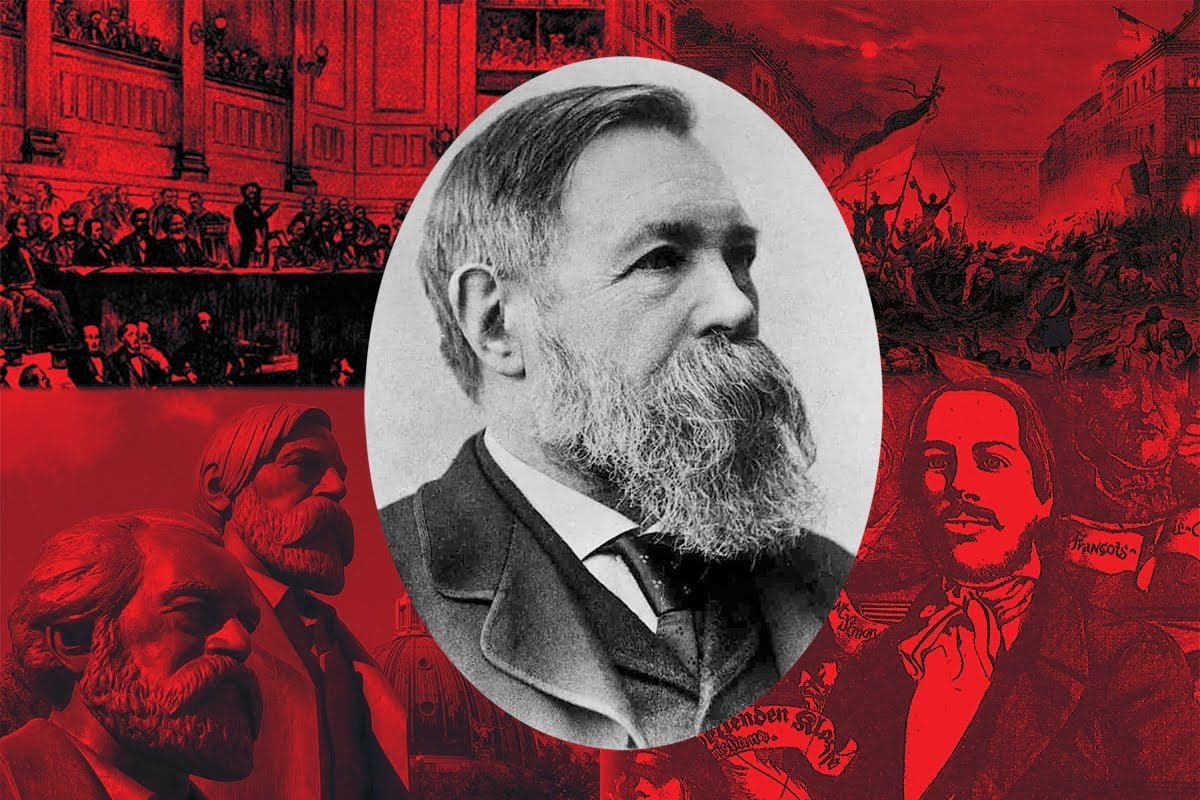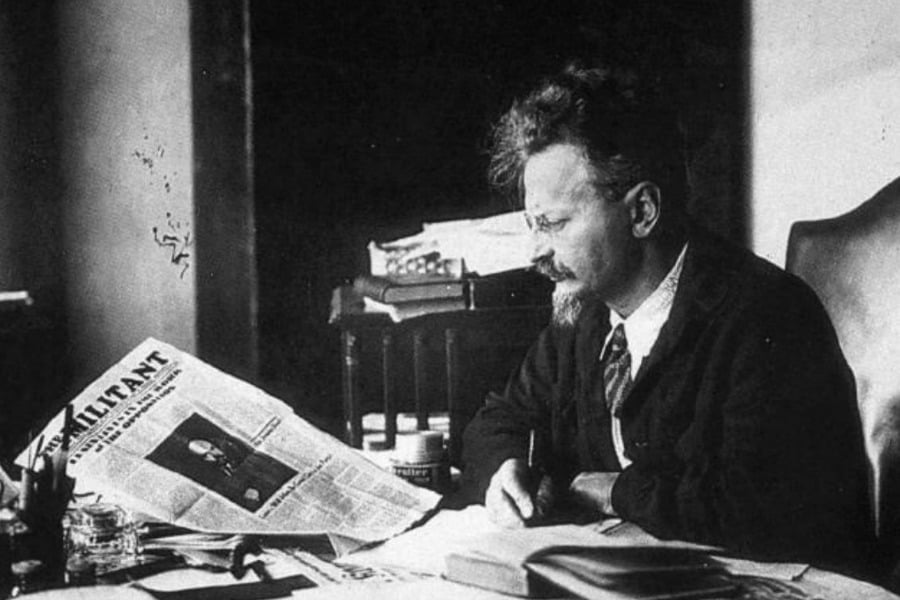After the death of Karl Marx in 1883, his close friend and collaborator, Friedrich Engels, took up the colossal task of preparing what would become volumes 2 and 3 of Capital using Marx’s manuscripts.
In the course of this work he discovered Marx’s notes on Ancient Society, by the American anthropologist, Lewis Henry Morgan. On the basis of these notes, Morgan’s work and further extensive research, Engels would go on to produce The Origin of the Family, Private Property and the State: a true masterpiece of historical materialism and one of the greatest works of Marxist theory ever produced.
In the text, Engels responds to many of the most groundbreaking anthropological studies of the day and goes on to explain the material basis of the oppression of women and the state, demonstrating that they are not timeless, eternal phenomena, but rather products of history that arose along with the division of society into classes, and will cease to exist with the overthrow of private property. As Engels puts: “The society which organizes production anew on the basis of free and equal association of the producers will put the whole state machinery where it will then belong – into the museum of antiquities, next to the spinning wheel and the bronze axe.”
Engels’ revolutionary conclusions have gone on to inspire and educate generations of Marxists. Lenin, who based much of his classic work, The State and Revolution, on Engels’ text, described it as “one of the fundamental works of modern socialism.” Almost 140 years since it was written, it continues to be essential reading for anyone who wants both to understand and change the world.
Prefaces and Chapter 1
In the prefaces, Engels sets out a concise explanation of the materialist conception of history, moving on to discuss the evolution of thought on the history of the family, focusing on scholars such as Bachofen, Mclennan, and finally LH Morgan, whose Ancient Society (along with Marx’ own notes on the text) formed the inspiration for Engels’ work.
In Chapter 1, Engels summarises Morgan’s conclusions on anthropology arrived at in Ancient Society. Morgan divides human social development into three stages: savagery, barbarism, and civilisation. These are also divided into upper, middle and lower stages. The terms savagery and barbarism are no longer used in modern anthropology; nevertheless, modern scholars continue to follow the same basic schema.
Savagery is now referred to as the paleolithic, which is divided into lower, middle and upper stages. The lower stage refers to the date of the earliest known stone tools (around 3.3 million years ago) and coincides with the origins of the first hominins (our direct evolutionary ancestors). It extends all the way until 300,000 years ago, when physiologically modern humans (homo sapiens) first emerged. The middle stage marks the infancy of our species, when we developed hand axe stone tools (marking a very important cognitive leap). The upper stage begins about 50,000 years ago, ending 12,000 years ago.
Parts of the lower stage of barbarism that Engels describes are now lumped into the upper paleolithic (or mesolithic), and societies that have this character are sometimes called ‘transegalitarian’ hunter gatherers. Other parts of this lower stage, along with the middle stage of barbarism, are now called the neolithic (characterised by the emergence of farming, herding and pottery).
Engels marks the beginning of the upper stage of barbarism with the smelting of iron and places the Greeks at the time of Homer at this stage of development. Subsequent discoveries have placed the beginning of this stage even further back in time to the “chalcolithic” (Copper Age) in a number of places around the world. Crucially, what unites all societies at this stage of development is the presence of metalworking and rising urbanism, along with increasingly marked stratification and inequality. In short, these are societies “preparing to make the next advance”, to civilisation.
Discussion questions:
- What aspects of Ancient Society does Engels praise?
- Why was Morgan’s work such an inspiration for him?
- What, according to the materialistic conception, is the determining factor in history, in the last analysis? Why is this the case?
- This ‘determining factor’ is of a two-fold character, what are the two key aspects?
- In capitalism, where human labour is highly developed, it is property relations which dominate society. When technology is at a lower level of development, such as in mobile hunter gatherer bands, what dominates human society instead?
- What are the 3 major ‘epochs’ of human society? What are their characteristics?
Chapter 2: The Family
Here Engels explains many of the ideas formulated by Morgan on the evolution of human kinship. It outlines the development of the family through 4 main stages: the Consanguine family, the Punaluan family, the Pairing family, and finally, the Monogamous family. The first 3 are seen as evolutionary developments – forms of natural selection that banned incest piece by piece, resulting in a more intelligent and healthy species. Only the last stage, monogamy, was an economic development, spurred by the development of private property. It is with the emergence of monogamy, Engels claims, that patriarchy emerges.
Discussion questions:
- Describe the key characteristics of the four stages of the family. How did each form of marriage lay the basis for the next? What were the main progressive leaps made by each development of the family?
- Until the development of the monogamous family, women continue to be held in high regard. Why is it that even in the pairing family women still retain a high level of respect and authority in the primitive community and in the household?
- Why, according to Engels, does mother right precede patrilineal descent?
- Engels says that with the emergence of pairing marriage natural selection had completed its task. Why is this?
- In earlier stages of barbarism, slavery was of little use. Instead, captives of war were killed or absorbed into the tribe. Why?
- Explain the impact of the emergence of private property and wealth inheritance relations:
- Between men, women and the Gens; and
- Between men and women within the household.
- If the monogamous family essentially enslaved women, why did Marx and Engels call it progressive?
Chapter 3: The Iroquois Gens
In this chapter, Engels discusses an example of the development of the family and a form of social organisation does not have a state. He first discusses the Iroquois, whose family structure and social institutions had been closely analysed by Morgan. In describing the Iroquois gens, Engels demonstrates that it is possible for human beings to live together on an egalitarian basis, without either slavery or state power. However, he also explains that these egalitarian societies could remain so for many years because the level of economic development was relatively low. As the development of the productive forces gave rise to a greater and more reliable surplus, particularly with the birth of agriculture, “The power of this primitive community had to be broken, and it was broken.”
Questions:
- What is a gens? How are the gens, gentes, phratries, tribes, federations related to one another?
- Why was no member initially allowed to marry within the gens?
- How did members of the gens settle disputes or wage war without a state?
- What was the basis for this relative social equality within the gens?
- Why was the gentile organisation “doomed”, according to Engels?
Chapters 4 and 5: The Greek Gens and the Athenian State
These chapters trace the development of gentile society into class society and the development of the state in Athens. It is here that Engels adds major contributions to the ideas of Morgan by explaining the emergence of civilisation out of barbarism through powerful economic forces, rather than simply the product of great individuals or new cultural ideas. He explains that the origins of the Athenian state can, in effect, be traced back to the massive social tumult caused by the development of money, which penetrated “like a corrosive acid” into the life of the rural community. Peasants remained on the land, paying extortionate rents. Those who could not pay were forced to sell themselves and their children into slavery to pay their debts.
This opened up a period of social tumult so great that it proved the necessity for a state in practice – one which could defend the interests of the propertied classes and, when necessary, curb their worst excesses in the name of order.
Questions:
- What would you say are the fundamental features common to all tribal constitutions under consideration? What are some key differences between the Iroquois, Greek and Roman constitutions?
- To what extent is it correct to speak of monarchs in the period of gentile society?
- How did private property emerge in Athenian society?
- Why was the gentile constitution “absolutely irreconcilable with money economy”?
- What effect did the introduction of money and usury have on Athenian society?
- What is the state, and how is this demonstrated concretely in these chapters?
Chapter 6: The Gens and the State in Rome
This chapter discusses the formation of the Roman state out of the gentile constitution in Rome. Engels describes the Roman gens as being generally similar to the Greek gens – exogamous, with elected chiefs, organised in phratries called curiae.
As the trade and wealth of Roman society increased, the gens no longer needed to be completely equal as a result of scarcity, and now that surplus could be produced, not everybody had to labour on the land. The senate was made up of the elected members of the gens. However, in the new Roman society, this group became the ‘patricians’, the beginning of the hereditary nobility.
Roman conquest eventually began to incorporate people who were not members of any gens – these became known as plebes and had no civil rights. Against this, the old gentile constitution could not stand. Out of the struggle between the plebes and the old order arose the division of society into a new constitution based on wealth. A new assembly was formed, made up of “classes”, which were divided on the basis of property. Effectively this was now a complete state after which the whole history of Rome, with the replacement of the peasants by slaves, was free to run its course.
Questions:
- Why does Engels emphasise that, in the original laws of the Roman gens, women married outside the gens?
- Why did the Romans initially elect a senate, and what prevented this from being a fully formed state?
- What were the contradictions in Roman society which eventually led to the complete downfall of the gentile constitution?
- How does this compare to the rise of the Athenian state discussed in previous chapters? What are the similarities and differences?
- How did the Roman state set itself up as an independent public power? Was it really independent?
Chapters 7 and 8: The Gens among the Celts and Germans and the Formation of the State among the Germans
In this chapter, Engels identifies evidence of the gentile organisation in Scottish, Irish and German tribes and then goes on to explain how the German gentile constitution observed by Tacitus in the first century AD would later be transformed into the first feudal states, which emerged out of the conquest of decaying Roman Europe.
Approaching the end of the 5th century, the Roman Empire was getting weaker and weaker. There was a general impoverishment, decline of commerce, handicrafts and art, fall in the population, decay of the towns, and the relapse of agriculture to a lower level.
As slavery declines, peasants called colonii were given small portions of land which they paid rent for annually. They were tied to these lands and could be sold together with the plot. They were not slaves but they were not free either, the predecessors of the serfs of feudalism.
As the Germans conquered, they took over the majority of the land. As time passed, there was the weakening of the bond of blood in the gens, with increasing numbers of Romans being integrated into these germanic societies. But now the Germans had to organise what they were conquering. Something had to be put in place to replace the Roman state, and the substitute was another state. Since the immediate representative of the conquering people was their military leader, this led to the transformation of military leadership to kingship.
Questions:
- What were the similarities and differences between the German gens and its Iroquois, Greek, and Roman counterparts?
- Why does Engels emphasise the relative respect for women within the Germanic gens?
- What effects did contact with the Romans have on this organisation?
- Is it still accurate to describe the German gens as tribal, or gentile, even though many germanic societies had princes (or chiefs), heirlooms, and hereditary wealth?
- Why was the rule over subjugated people incompatible with the gentile constitution?
- How was military leadership transformed to kingship?
- How did this period lay the basis for feudalism?
- Why did Engels consider serfdom “a form of servitude which thus stands high above slavery”?
- Why is it that “only barbarians are able to rejuvenate a world in the throes of collapsing civilization”?
Chapter 9: Barbarism and Civilisation
In this final chapter Engels summarises the content of the entire text, now bringing to the fore a general theory of kinship evolution, the emergence of private property (i.e. class society), and the State. However, this is not a mere summary of the previous chapters. Engels here explicitly outlines why certain conditions are necessary for the development and decline of the (bourgeois) monogamous family, women’s oppression, class society and the state. This chapter and indeed the whole text, are a sharp rebuttal to the anti-materialist and anti-scientific idea that human society is not subject to general laws like the rest of nature. This chapter is also quoted at length by Lenin in The State and Revolution because it essentially lays the basis for the Marxist approach to the state.
Questions:
- What are the key characteristics of the gentile constitution? What is its economic basis?
- What was the impact of farming and agriculture on:
- (a)the family; and
- (b) wider society?
- How does exchange go from a communal affair headed by the chief, to an individual affair?
- How and why does money emerge?
- Why did slavery emerge?
- What is the state? How did it come into being? What role does it play in society?
- What is the role of the class struggle in history?
- What does Engels mean when he writes, “Chance is only the one pole of a relation whose other pole is named ‘necessity’”? How does this help us to understand history and society today?





